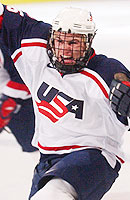For the first time in history, the United States has won the World Junior Championships, doing it in dramatic fashion.
Team USA scored three unanswered third-period goals to overcome a two-goal deficit, capped by Patrick O’Sullivan’s second of the game with just over five minutes remaining, to defeat Canada, 4-3.
O’Sullivan actually didn’t put in the winning goal; Marc-Andre Fleury, the No. 1 overall NHL draft pick from last June, who has played this season for the Pittsburgh Penguins, tried to clear a puck that came to his crease. Instead of covering it or steering it aside, he tried to shoot it out up the middle, and it wound up hitting the shoulder of his defenseman, Braydon Coburn, and ricocheted back into the Team Canada net.

The U.S. held on down the stretch without a major threat from Canada. Afterwards, there were tears of joy on the U.S. side as the gold medals were handed out and the national anthem was played.
“There’s no other feeling like hearing your national anthem and seeing your flag being raised,” said Team USA head coach Mike Eaves, who took two weeks off from his job as coach at Wisconsin. “I wish I could sing. The words were coming out, but I’ve got a brutal voice, to be honest with you.”
Team USA finished the World Junior championships with a perfect 6-0 record. It was the second time the U.S. was playing for the gold medal; it lost to Canada in 1997. It’s only the fourth medal in the tournament’s 28-year history for the U.S., which won bronze in 1992 and 1986.
The win is the biggest in International hockey for the United States since defeating Canada for the gold medal of the World Cup in 1996. That game also featured a third-period comeback, capped by Tony Amonte’s game winner. The U.S. lost the gold medal game to Canada at the Olympics in Salt Lake City in 2002.
Canada settled for the silver for the third straight year, and it lost a third-period lead all three times, the previous two times to Russia. Canada has now gone an unheard of seven straight years without a gold. It has won 10 golds overall, including five straight from 1993-97, before the drought began.
Earlier Monday, host Finland defeated the Czech Republic, 2-1, taking the bronze for the second straight year.
North Dakota forward Zach Parise (5-6–11) was named the Most Valuable Player of the tournament by the media. He entered the game as the leading scorer in the tournament, though finished tied after Canada’s Nigel Dawes and Anthony Stewart each turned in three-point efforts. All three finished with 11 points, though Dawes led in goals with six.
“We were disappointed with our first two periods but they hadn’t seen our best hockey and we showed it to them in the third period,” Parise said to the Canadian Press.
Michigan goalie Al Montoya, who played every minute for Team USA, was named the tournament’s top goaltender.
The United States fell behind 3-1, but started the comeback with an odd-man rush just over four minutes into the third period. Boston College’s Patrick Eaves fed O’Sullivan a cross-ice pass, and O’Sullivan beat Fleury high, cutting the lead to 3-2. Former Ohio State skater Ryan Kesler tied the game gathering up a rebound from Fleury’s pads just under two minutes later. Kesler was a first-round draft pick last June and left Ohio State after one season to sign a contract with the Vancouver Canucks.
Canada scored early in the first period, as Nigel Dawes placed a perfect shot past Montoya. Dan Fritsche, who plays in the NHL for the Columbus Blue Jackets, tied the game at 8:57.
Canada took advantage of an intermission lull by the American defense, scoring in the first 12 seconds of the second period to reclaim a one-goal lead. It was Dawes that struck again for the Canadians, tipping in a shot by Michigan’s Jeff Tambellini, the only U.S. college player on Team Canada. Canada extended its lead at 12:56 when Stewart got a step on the U.S. defense and blasted it past Montoya from the blue line. The goal came just after O’Sullivan had missed an open net on the other end.
Team USA was back on its heels the rest of the second period. Canada had two chances to extend the lead on breakaways before the end of the second period, but couldn’t convert. Later, Canada had 42 seconds of a two-man advantage but couldn’t score.
“Being down 3-1, we talked about, ‘What are the things that we can control?’ We talked about working hard and manufacturing some goals,” said Eaves. “I don’t know who’s the first guy that said it, but I know a lot of athletes have said it: When you work hard, you make your own good luck. The kids just kept pounding away. The first two goals were good goals and the last one was a little bit of a fortunate one. But we worked darn hard to get there and we created our own luck.”
The United States will get to defend its title on home turf next year. The tournament will be held mainly in Grand Forks, N.D., at Ralph Engelstad Arena.
“[Winning the tournament is] awesome for our program, especially since the world juniors are going to be in Grand Forks next year,” said Parise to the Canadian Press.
Twelve players from the Eaves-coached team that won the Under-18 World Championship in 2002 were on this year’s World Junior Championship team.


